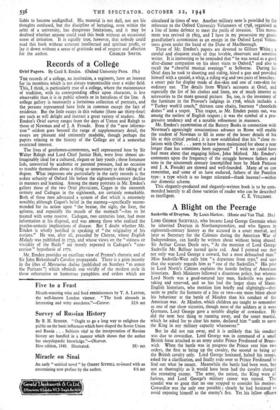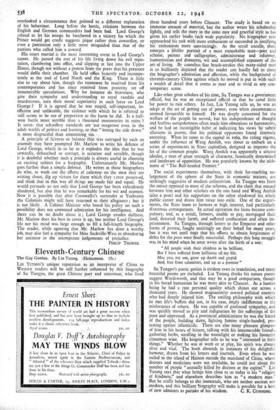A Blight on the Peerage
Sackville of Drayton. By Louis Marlow, . (Home and Van Thal. 21s.)
Loan GEORGE SACKVILLE, who became Lord George Germain when he inherited Drayton in Northamptonshire, and who figures in eighteenth-century history as the accused in a court martial, and later as Secretary for the Colonies during the Atnerican War of Independence can hardly be written about without being abused. Sir Arthur donan Doyle says, " At the mention of Lord George Sackville Mr. Balfour turned quite red. And I pointed out that not only was Lord George a coward, but a most debauched man." Miss Sackville-West calls him " a departure from type," and says that she scarcely regards him as " one of the Sackvilles." His post in Lord North's Cabinet explains the hoStile feeling of American historians. Both Ministers followed a disastrous policy, but whereas Lord North was a good-natured lazy man, Sackville was pains- taking and reserved, and so has had the larger share of blame. English historians, who mention him briefly and slightingly—they seem to prefer the footnote of a line or two—are more bitter about his behaviour at the battle of Minden than his conduct of the American war. At Minden, which children are taught to remember as one of our show victories, though most of the soldiers at it were Germans, Lord George gave a notable display of cowardice. He did the next best thing to running away, and the court martial, which he asked for to clear his name, declared him " unfit to serve the King in any military capacity whatsoever."
But he did not run away, and it is unlikely that his conduct was due to cowardice... Lord George was in command of a small British force attached to an army under Prince Ferdinand of Reims- wick. When the battle was in progress the Prince sent him two orders, the first to bring up the cavalry, the second to bring up the British cavalry only. Lord George hesitated, halted his troops, asked for a clarification, and finally rode over to Prince Ferdinand to find out what he meat. Meanwhile the battle had been won, but not as thoroughly as it would have been had the Cavalry charged' the retreating enemy. "The army, the nation, the King were all furious, and Lord George's military career was ruined. The scandal was so great that no one stopped to consider his motives. Cowardice was, the only one possible ; clearly 'he had hesitated to avoid exposing himself to the enemy's fire. Yet his fellow officers
overlooked a circumstance that pointed to a different explanation of his behaviour. Long before the battle, relations between the English and German commanders had been bad. Lord George's refusal to let his troops be butchered itr a victory for which the Prince would get credit suggests pique rather than cowardice, or even a patriotism only a little more misguided than that of the patriots who called him a coward.
His court martial is the most interesting event in Lord George's career. He passed the rest of his life living down his evil repu- tation, clambering into office, and slipping at last into the Upper House, though not without a protest from the peers that his presence would defile their chamber. He held office honestly and incompe- tently as the tool of Lord North and the King. There is little else to Fay about him, though the treatment he received from his contemporaries and has since received from posterity set off innumerable speculations. Why for instance do historians, who give their sympathy and understanding to royal vandals and murderesses,, turn their moral superiority in such force on Lord George ? If it is agreed that he was stupid, self-important, in- efficient 'and unlikeable, the violence with which he is: referred to still seems to be out of proportion to the harm he did: Is a half- won battle more terrible than, a thousand monasteries in ruins ? It seem:, that schoolboy standards are not outgrown' even in the adult worlds of politics and learning, so that " letting the side down" is more disgraceful than committing ,sin.
A principle of fairness or balance ihitt Was outraged by such an anomaly may have prompted Mr. Marlow to write his defence of Lord George, which in so far as it explodes the idea that he was cowardly, debauched or corrupt, is accurate and sensible, though it is doubtful whether such a principle is always useful in choosing an exciting subject for a biography. Unfortunately Mr. Marlow goes further than a simple defence. He writes as those biographers do who, to wash out the effects of calumny on the men they are writing about, dig up virtues for them which they r ever possessed, and think that in this way all things are' made fair and equal. He would persuade us not only that Lord George has been ridiculously slandered, but also that he was remarkable for his wit and acumen. Now it is possible that after Cornwallis's surrender at Yorktown the Colonists might still have returned to their allegiance ; but it is not likely. A Cabinet Minister who based his policy on such a possibility does not command admiration for his intelligence. And there can be no doubt about it ; Lord George exudes dullness. Mr. Marlow does his best to cover it up, but neither Lord George's life nor his mind was large enough to fill a full-length biography. The reader, while agreeing that,Mr. Marlow has done a• worthy job, may also feel a sympathy for Miss Sackville-West in abandoning her ancestor to the intemperate judgements of prejudice.
PHILIP TROWEL



































 Previous page
Previous page